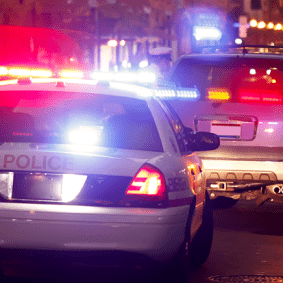April 21st, 2016 by Attorney Dan Carman

It’s happened to many of us. You’re traveling along when all of a sudden, you find yourself joining a line of cars being checked by law enforcement. They might be scrutinizing any number of things such as registrations, seatbelt use, or sobriety. Driving while intoxicated is a particularly dangerous activity. The National Highway Traffic Safety Administration (NHTSA) reports that almost 10,000 people were killed in 2014 in vehicle crashes involving alcohol, 171 of them in Kentucky. Over 872,100 people were arrested that year for driving under the influence, and nearly 20,000 of those arrests occurred in Kentucky.
Roadblocks, or “Traffic Safety Checkpoints,” are allowed because, e.g., the government’s strong interest in removing drunk drivers from roadways greatly outweighs the brief restraint of motorists stopped at a roadblock. While addressing the issue of impaired drivers is an important public safety issue, the Supreme Court has provided a balancing test to help determine whether police roadblocks violate the search and seizure provisions of the Constitution. The gravity of the public concerns saved by the seizure, the degree to which the seizure advances the public interest, and the severity of the interference with individual liberty must all be weighed. To be constitutional, the roadblock must also have a primary purpose, such as keeping the highways safe from intoxicated drivers.
Kentucky’s highest court recently overturned a DUI conviction in Marion County upon finding that a KSP checkpoint violated the motorist’s Fourth Amendment rights. In that ruling, the court laid out general guidelines for law enforcement to follow when setting up roadblocks to help ensure they are constitutionally reasonable temporary seizures:
- It is important that decisions regarding the location, time, and procedures governing a particular roadblock should be determined by those law enforcement officials in a supervisory position, rather than by the officers who are out in the field. Any lower ranking officer who wishes to establish a roadblock should seek permission from supervisory officials. Locations should be chosen so as not to affect the public’s safety and should bear some reasonable relation to the conduct law enforcement is trying to curtail.
- The law enforcement officials who work the roadblock should comply with procedures established by their superior officers so that each motorist is dealt with in exactly the same manner. Officers in the field should not have unfettered discretion in deciding which vehicles to stop or how each stop is handled.
- The nature of the roadblock should be readily apparent to approaching motorists. At least some of the law enforcement officers present at the scene should be in uniform and patrol cars should be marked in some manner. Signs warning of checkpoint ahead are also advisable. Best practice is also to advertise the roadblock’s location and time beforehand in the local media.
- The length of the stop is an important factor in determining the intrusiveness of the roadblock. Motorists should not be detained any longer than necessary in order to perform a cursory examination of the vehicle to look for signs of intoxication or check for license and registration. If during the initial stop, an officer has a reasonable suspicion that the motorist has violated the law, the motorist should be asked to pull to the side so that the other motorists can proceed.
Roadblocks in Kentucky must be structured, and not hastily arranged. Arguably, law enforcement in Kentucky may no longer decide mere minutes before it is to begin to set up a roadblock. At a minimum, they must be organized by a law enforcement supervisor, must have specific guidelines for how to stop cars, must be readily apparent and visible to drivers, and must not stop drivers for too long. A successful Motion to Suppress evidence due to an unlawful roadblock, expertly handled by a seasoned DUI defense lawyer, will win a DUI case.
If you have any questions about this topic or about your constitutional rights during a police checkpoint, you can find out more by discussing it with one of the attorneys at the Lexington, KY-based Carman Law Firm. As criminal defense lawyers with years of experience, we offer thorough, experienced representation. Call today at (859) 685-1055 or fill out this online contact form to find out how we can help you.

 Focusing on criminal matters, Mr. Carman is admitted to practice law in all Courts of the Commonwealth of Kentucky, the United States District Courts for the Eastern and Western Districts of Kentucky, and the United States Court of Appeals, Sixth Circuit. He is a member of the American, Kentucky, and Fayette County Bar Associations. Mr. Carman also worked as a prosecutor, as well as a legal assistance attorney. Attorney Dan Carman can help you with any criminal defense matters you may need including; DUI, drug, and weapons charges, trespassing, traffic violations and more. [
Focusing on criminal matters, Mr. Carman is admitted to practice law in all Courts of the Commonwealth of Kentucky, the United States District Courts for the Eastern and Western Districts of Kentucky, and the United States Court of Appeals, Sixth Circuit. He is a member of the American, Kentucky, and Fayette County Bar Associations. Mr. Carman also worked as a prosecutor, as well as a legal assistance attorney. Attorney Dan Carman can help you with any criminal defense matters you may need including; DUI, drug, and weapons charges, trespassing, traffic violations and more. [